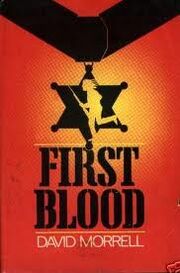
First edition hardcover of First Blood.
First Blood is a 1972 psychological thriller novel by writer David Morrell that introduced Rambo, although he is a much different character than in the movies.
Plot[]
The book begins with Rambo, a Vietnam war veteran, hitch hiking in Madison, Kentucky. He is picked up by Sheriff Teasle (himself a Korean War veteran) and dropped off at the city limits. When Rambo repeatedly returns, Teasle finally arrests him and drives him to the station. He is charged with vagrancy and resisting arrest and is sentenced to 35 days in jail. Being trapped inside the cold, wet, small cells gives Rambo a flashback of his days as a prisoner of war in a Viet Cong prison camp, and he fights off the cops as they attempt to cut his hair and shave him without shaving cream, beating one man and slashing another with the straight razor. He flees, steals a motorcycle, and hides in the nearby mountains. He becomes the focus of a manhunt that results in the deaths of many police officers, civilians, and National Guardsmen.
In a climactic ending in the town where his conflict with Teasle began, Rambo is finally hunted down by special forces Colonel Sam Trautman and Teasle. Teasle, using his local knowledge, manages to surprise Rambo and shoots him in the chest, but is himself wounded in the stomach by a return shot. He then tries to pursue Rambo as he makes a final attempt to escape back out of the town. Both men are essentially dying by this point, but are driven by pride and a desire to justify their actions. Rambo, having found a spot he feels comfortable in, prepares to commit suicide by detonating a stick of dynamite against his body; however, he then sees Teasle following his trail and decides that it would be more honourable to continue fighting and be killed by Teasle's return fire.
Rambo fires at Teasle and, to his surprise and disappointment, hits him. For a moment he reflects on how he had missed his chance of a decent death, because he is now too weak to light the dynamite, but then suddenly feels the explosion he had expected—but in the head, not the stomach where the dynamite was placed. Rambo dies satisfied that he has come to a fitting end. Trautman returns to the dying Teasle and tells him that he has killed Rambo with his shotgun. Teasle relaxes, experiences a moment of affection for Rambo, then dies.
Background[]
Morrell stated he was inspired to write the novel by hearing about the experiences of his students at the University of Iowa who had fought in Vietnam. The author also said "When I started First Blood back in 1968, I was deeply influenced by Geoffrey Household's Rogue Male." The character's name was derived in part from a brand of apples, which his wife brought home while he was struggling to think up a name for the character. In the DVD commentary for 'First Blood' Morell comments that one of the inspirations for Rambo was World War II hero Audie Murphy.
Reception[]
Some reviews for the book lambasted it for its excessive violence, although the suspense was praised. John Skow of TIME described the book as "carnography", while the book was praised by Newsweek as "First-rate", by the New York Times Book Review as "A fine novel" and by the thriller writer John D. MacDonald as "one hell of a hard, fast novel". When Stephen King taught creative writing at the University of Maine, he used it as a textbook, and the book has been translated into 26 languages.
Film Adaptation[]
Shortly after its publication in 1972, Morrell rights were sold to Columbia pictures, who in turn sold them to Warner Bros. This trend continued for ten years. The story passed through three companies and eighteen screenplays. Finally, it was sold to Andrew G. Vajna and Mario Kassar, who turned the character of Rambo into a more likable underdog who never killed anybody, instead of the angry, psychotic character in the book who goes on a bloody rampage and virtually brings the Vietnam War to America. The role was offered to many celebrities like Dustin Hoffman and Al Pacino until it reached Sylvester Stallone. The film was well-received by critics and saved Stallone's career.
